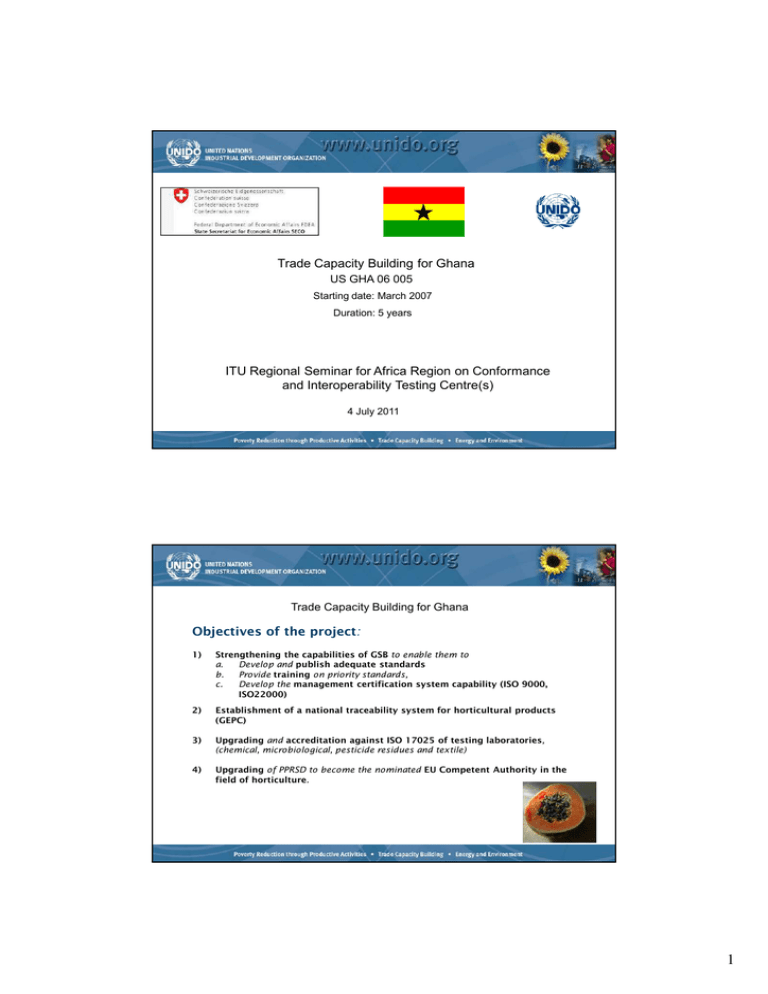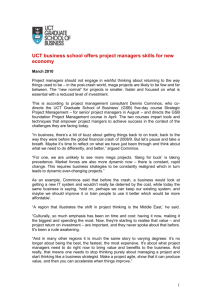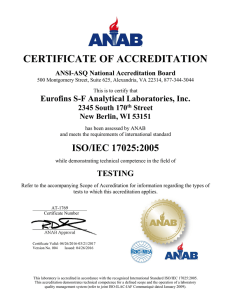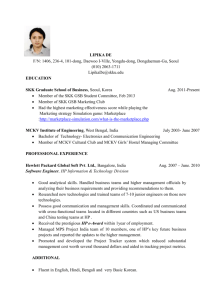Trade Capacity Building for Ghana and Interoperability Testing Centre(s)
advertisement

Trade Capacity Building for Ghana US GHA 06 005 Starting date: March 2007 Duration: 5 years ITU Regional Seminar for Africa Region on Conformance and Interoperability Testing Centre(s) 4 July 2011 Trade Capacity Building for Ghana Objectives of the project: 1) Strengthening the capabilities of GSB to enable them to a. Develop and publish adequate standards b. Provide training on priority standards, c. Develop the management certification system capability (ISO 9000, ISO22000) 2) Establishment of a national traceability system for horticultural products (GEPC) 3) Upgrading and accreditation against ISO 17025 of testing laboratories, (chemical, microbiological, pesticide residues and textile) 4) Upgrading of PPRSD to become the nominated EU Competent Authority in the field of horticulture. 1 Key developments Project actively started in March 2007 Mid term evaluation carried out in June 2009. A non-cost extension was granted until Dec 2010. Project redefined its outputs to current context Oct 2009. Areas of intervention and institutions 1. 2. 3. 4. 5. 6. GSB Development Plan (GSB) Certification Body (GSB) Standard Setting (GSB) National Traceability System (GEPC) Competent Authority (PPRSD) Laboratory Upgrade (GSB,PPRSD,FDB) 2 Output 1.1 Assisting GSB in its restructuring process (GSB) Key Activities conducted: Vision and mission established* SWOT analysis conducted* Training and development of top GSB management conducted – certification workshop Strategy developed* Business/Sustainability plan developed* Analysis and proposal of NQI strategy NQI workshop conducted National Quality Policy draft developed High level implementation draft for NQI under preparation *Activities funded by GOG Organogram, GSB Progress 0% 100% Output 1.2 Strengthening GSB standard setting process (GSB) Key Activities conducted: Priority sectors identified SPS mapping for main exports conducted Training at Trade Policy Training Centre in Arusha, Tanzania GSB staff participated in ISO e-learning course* GSB staff participated in TBT seminar training 21 Standards published* Technical Committees established (Cowpea, Herbal Drugs, Fresh Yam, Food Safety and Food Manufacturing , Inspection Manual for Yam, Adoption of IPPC Manuals) to develop 30 new standards Inspection manuals developed for each standard *Activities funded by GOG 3 Output 1.2 Strengthening GSB standard setting process (GSB) Next Steps (in progress): To hold awareness seminars To develop pictorial version for standard To conduct workshop for dissemination To gazette new standards Under the Regional Programme (WAQP): (WAQP) Workshops have been held to develop and harmonize standards 80% Progress 100% 0% Output 1.3 Development of GSB capability to disseminate voluntary standards and to train SMEs (GSB) Key Activities conducted: Trainings prepared in coordination with GSB: ISO National Workshop On Conformity Assessment Infrastructure Supporting Trade, day 1: plenary session – ISO National Workshop on conformity assessment held (Group 1: Laboratories, Group 2: Certification & Inspection) – Training and awareness on GLOBALGAP benchmarking processes – Training on food safety standards – Training on quality and hygiene, in particular ISO 22000 (HACCP) and ISO 9000 – A pool of national consultants trained on ISO 22000 and prepared to act as UNIDO consultants – Training of consultants on ISO 9001 Training on food safety standards ISO National Workshop On Conformity Assessment Infrastructure Supporting Trade, Group 2 4 Output 1.3 Development of GSB capability to disseminate voluntary standards and to train SMEs (GSB) Key Activities conducted: Assistance to pilot enterprises by trained national consultants and international expert –Selection & initial assessment of enterprises to be assisted to achieve ISO 22000 and HACCP certification conducted –Work plan developed to implement standards requirement to enterprises –Road map for implementation for ISO 22000 and ISO 9000 for selected enterprises Training of consultants in ISO 22000 95% Progress 0% 100% Outcome 1. Results observed GSB has restructured its organization to be a customer focused organization* GoG has drafted its 1st Quality Policy and is working to develop/establish it in the near future Trained GSB staff contribute to the appropriate development, dissemination and implementation of standards GSB follows best international practice in their standard setting process activities 5 Output 2.1 Establishment of National Traceability System (GEPC) Key Activities conducted: Main export and challenges identified Exporter’s database established (GEPC) Study tour for GEPC staff to the European conference on Training of trainers on traceability traceability National Traceability Committee set up Study Tour to the ETRACE facilities in Cairo, Egypt conducted – for members of national traceability committee Assessment of national traceability strategy, initiatives and current applications at enterprise level conducted (ETRACE UNIDO expert) Road map for national traceability system developed Training of trainers on traceability conducted, 3 day course Traceability manual for trainers and enterprises developed Traceability system for pilot enterprise applications Awareness seminar to identified stakeholders on traceability Output 2.1 Establishment of National Traceability System (GEPC) Key Activities conducted: implementation strategy followed up support given for the development of IT system of national traceability, required equipment purchased national consultants on selected traceability system trained (in cooperation with COLEACP Programme) pilot enterprise staff trained traceability system in 65 pilot enterprises implemented 95% Progress 0% 100% 6 Outcome 2. Results observed Functioning National Traceability Committee with representation from government and industry National Traceability strategy accepted and ongoing GEPC staff is capable of developing/providing sector specific training on traceability GEPC is capable of implementing traceability system at enterprise level Output 3.1 Development of organizational structure within GSB to form Ghana Certification Body Key Activities conducted: Study Tour to South African Standards Board Assessment of current status of GSB The scope for system certification identified (ISO 22000 + ISO 9000) Work plan to set up a certification body developed Establish CB as a unit of the current quality assurance division (governance structure) Draft documentation required for accreditation developed Manager of GCB appointed and Logo adopted Certification Committee established Impartiality Committee established Progress 0% 100% 7 Output 3.2 Development of technical and managerial capacity for GCB Key Activities conducted: Study Tour to South African Certification Body conducted Work plan for system certification capability established GSB staff trained on ISO 17021 Quality Management System and structure set in place ISO 22000 Lead Auditor course conducted ISO 9000 Lead Auditor course conducted Output 3.2 Development of technical and managerial capacity for GCB Next Steps: To provide initial assessments and audits to pilot enterprises To assist and certify enterprises on ISO 22000 and ISO 9000 To initiate pilot certifications To run complete cycles of certification activities for preparation for accreditation audit To prepare records and evidence of accreditation audit against ISO 17021 80% Progress 0% 100% 8 Outcome 3. Results observed GSB staff has the knowledge to run a certification body. Ghana Certification Body in place and working towards accreditation against ISO 17021 Local lead auditors ready to assist GCB in certification of enterprises in ISO 22000 and ISO 9000 GCB has successfully completed full cycles of certification activities. Output 4.1 Laboratory Upgrade (GSB,PPRSD,FDB) Key elements for Laboratory accreditation: 1. 2. 3. 4. 5. 6. 7. Infrastructure (building, environmental conditioning) Equipment (Hardware, CRM, consumables, all ready to use) Human capital (training and development) Documentation and literature (QMS, Procedures, manuals) Practical Experience Proficiency Tests Accreditation process (initial assessment, final audit, accreditation) 9 Current status 4.1 Laboratory Upgrade (FDB) Microbiology Key Activities conducted Gap analysis conducted Study tour to Sri Lanka conducted 2 Training seminars related to the ISO/IEC 17025 standard conducted Training session related to ISO/IEC 17025:2005 standard about internal auditing conducted Equipment installed Human capacity of lab evaluated Quality manuals developed Practical experience and internal audits established Proficiency testing conducted Scope of Accreditation •Fish / fishery •Water Next Step: To finalize quality manual To conduct blank audit Accreditation to be postponed until FDB lab moves to new facility 4.2 Laboratory Upgrade (GSB) Lab accredited in October 2009 by DACH Current status Pesticide Residue Scope of Accreditation •Organo phosphates •Organo chlorines •Carbamates •Pyrethroids 40% increase in Tests after Accreditation 10 Current status 4.3 Laboratory Upgrade (GSB) Microbiology Lab accredited by DACH in October 2009 40% increase in Tests after Accreditation Scope of Accreditation: •Fish/fisheries •Fruits and Beverages •Cereals Current status 4.4 Laboratory Upgrade (GSB) Chemical Key Activities conducted Gap analysis conducted 2 Training seminars related to the ISO/IEC 17025 standard conducted Training session related to ISO/IEC 17025:2005 standard about internal auditing conducted Human capacity of lab evaluated Equipment installed On-the-job training provided Quality and technical manuals developed partially Key additional equipment delivered and installed (HPLC) Next Steps: Scope of Accreditation: Documentation being reviewed by international expert •Mycotoxin (aflatoxin & ochratoxin) To conduct blank audit Maize Cocoa •Sudan dyes Estimated date of accreditation: Sep 2011 Palm oil To organize proficiency testing 11 Current status 4.5 Laboratory Upgrade (GSB) Textile Key Activities conducted Gap and needs assessment conducted Seminar related to quality assurance in textile testing and ISO/IEC 17025:2005 standard, tailored specific to the Ghanaian textile exports Training session related to ISO/IEC 17025:2005 standard about internal auditing conducted Premises reviewed and modifications completed to fit with requirements Equipment identified and ordered Human capacity evaluated Documentation developed partially Equipment installed and staff trained on use of equipment Next Steps: To organize practical experience To organize Proficiency Testing To conduct blank audit Scope of Tests •Fiber composition •Wash resistance •Tensile strength •Abrasion resistance 4.6 Laboratory Upgrade (PPRSD) Key Activities conducted Gap analysis conducted Current status Microbiology Seed Testing Lab Study Tour to Kenya conducted ISTA membership obtained Training to the Danish Plant Directorate Training session related to ISO/IEC 17025:2005 standard about internal auditing conducted Premises reviewed, civil work and the revamping are completed On site practical training on germination conducted Equipment installed Technical manual completed Quality manual yet to be completed Proficiency test conducted Scope of Accreditation •Seeds, grains and fruits (Sampling, Purity, Moisture, Germination) Estimated date of accreditation: Dec 2011 Training to the Danish Plant Directorate, Denmark 12 4.6 Laboratory Upgrade (PPRSD) Next Steps: To install additional identified equipment To conduct additional training on sampling To conduct blank audit Accreditation by ISTA (Dec 2011) 4.7 Laboratory Upgrade (WAQP) Under the regional programme, following are being established: Nigeria, Sierra Leone, Liberia, Guinea, Gambia, Cape Verde, Mauritania: Microbiological Testing Lab Chemical Testing Lab These labs are at various stages of development and are expected to be accredited against ISO 17025 before the end of year 13 4.8 Laboratory Upgrade (GSB) Current status Metrology Labs accredited by DKD in October 2008** 200% increase in Calibration after Accreditation Measured Quantities: •Mass •Pressure •Temperature **Lab Accreditation funded and supported by PTB of Germany 4.9 Laboratory Upgrade (GSB) Current status Metrology Labs to be accredited in 2012** Measured Quantities: •Density •Viscosity •Dimensional Metrology **Lab Accreditation to be supported by WAQP 14 4.9 Laboratory Upgrade (WAQP) Current status Metrology Metrology labs are being established in: Sierra Leone Guinea Liberia Gambia Labs to be accredited in 2012** Measured Quantities: •Temperature •Mass Laboratory Upgrade (Ghana Summary) Current status Date of obtained accreditation Estimated date of accreditation Pesticide Residue Microbiology Chemical GSB Textile Oct 2009 Oct 2009 Sep 2011 Microbiology FDB TBD Microbiology PPRSD Dec 2011 15 Outcome 4. Results observed Test result from accredited laboratory has been made using the same quality standards of any other accredited laboratory world-wide. Supported laboratories have proficient testing methods that are accurate, reliable and accepted internationally. Accredited laboratories can now demonstrate global recognition of their competence, impartiality and capability. Output 5.1 Upgrading of Competent Authority (PPRSD) Key Activities conducted Gap and needs assessment conducted Study Tour to CA in Kenya and South Africa conducted Awareness and training seminar on the structure and role of an EU CA conducted Practical training provided on the application of joint inspections on selected products (mango, pineapple, papaya and banana) in quality, SPS and food safety (incl. HACCP and traceability) Road map for strengthening of capacities of the CA developed Train inspectors from different regions on quality and phytosanitary national standards Train inspectors on marketing quality standards in Slovakia 16 Output 5.1 Upgrading of Competent Authority (PPRSD) Next Steps: To adapt legal regulations related to inspection of fruits and vegetables prior to export by a CA To conduct pilot inspection on priority products to enterprises To develop required documentation To amend organizational structure 80% Progress 0% 100% Outcome 5. Results observed PPRSD inspectors qualified on SPS standards, marketing standards and inspection techniques for priority products PPRSD staff qualified to train other inspectors and industry on inspection and marketing standards Draft legislation in line with EU requirements 17 Thank you for your attention 18


